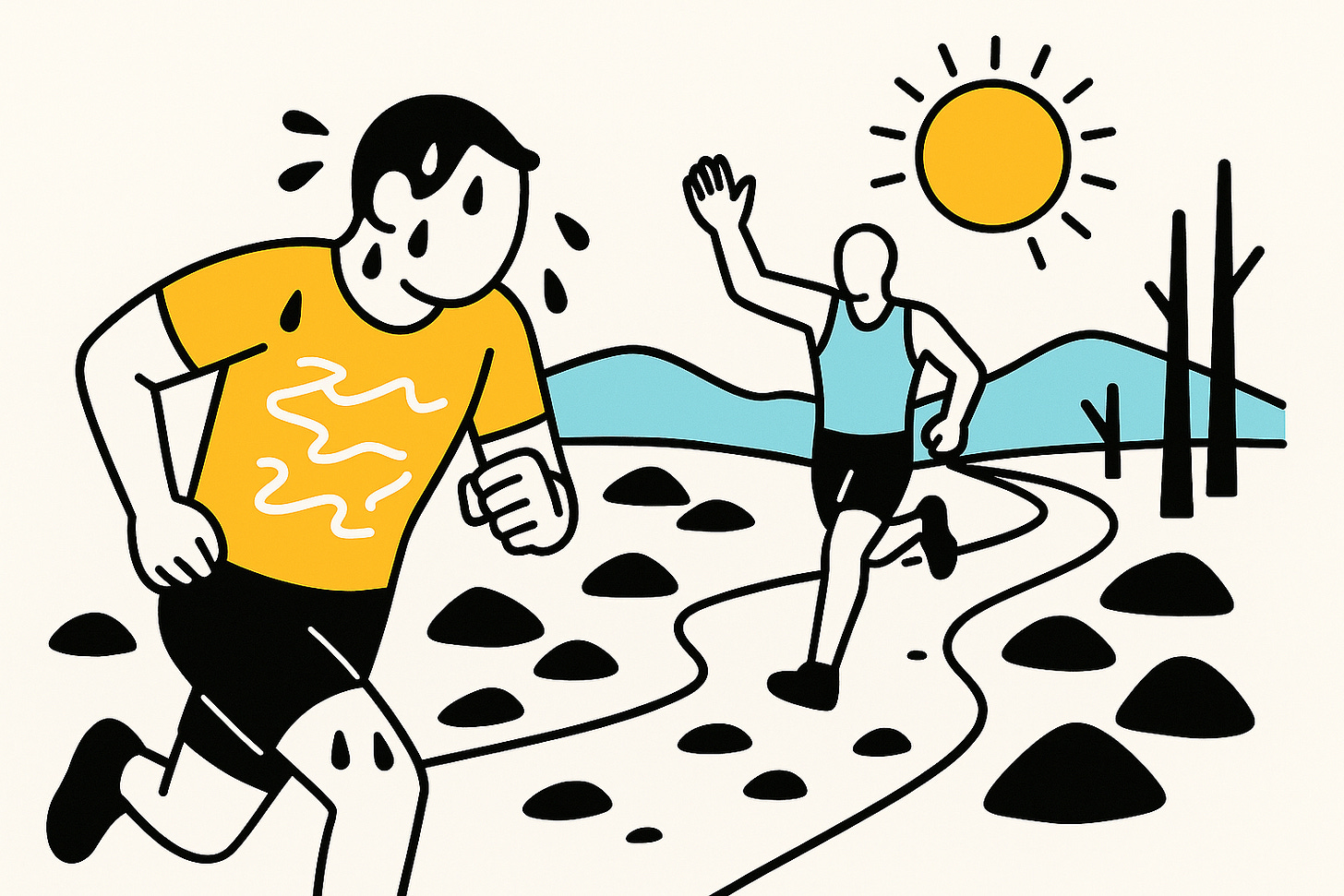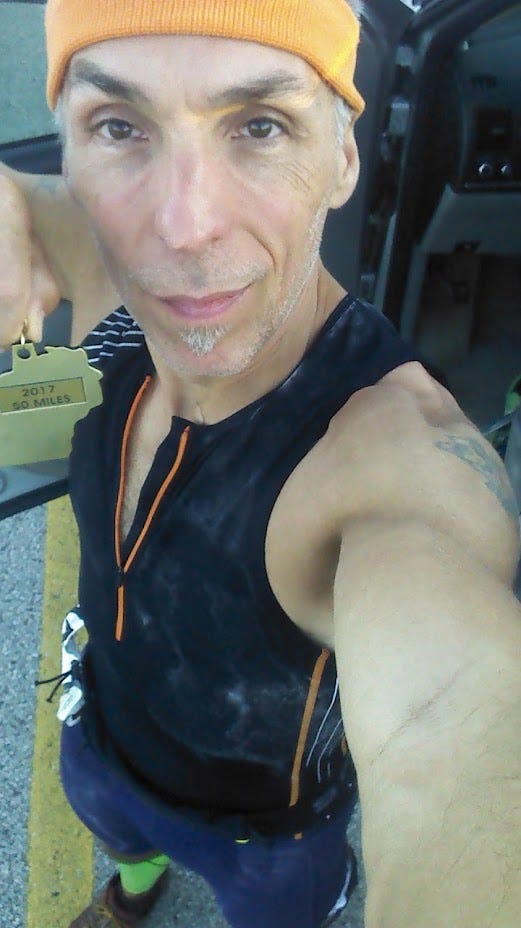Run, Salt, Run!
How a Sweaty Nickname Turned My Trail Misery into Mutual Victory
Picture this: I’m five miles from the finish of my first-ever 50-mile ultramarathon when I spot a fellow runner limping like she’s auditioning for a zombie flick.
As a firefighter, EMT, and stress coach, I’m no stranger to chaos or pushing through it. But this race, my first attempt at a distance that felt Herculean, reminded me that life’s rocky patches aren’t meant to be tackled alone. They’re opportunities for connection, humor, and that elusive growth we all chase, whether on the trail or in the firehouse.
Empathy in the Rocks
This was one of those rough race courses where the trail was a minefield - pockmarked with half-buried stones everywhere, ready to catch an unsuspecting big toe and trip you into oblivion. About five miles from the finish line, I passed a woman limping and clearly upset. My first responder senses tingled: falls on terrain like this aren’t usually just bruises; they can escalate fast if ignored. I was already deep in the pain cave myself: this being my first 50-miler, I was learning in real time just how rebellious the mind can get when the body’s running on fumes.
When I asked whether she was okay, she admitted she’d just taken a tumble. But when I pressed - gently, like I do in coaching sessions (because “I’m fine” often masks a deeper struggle) - she insisted it was just a big “pity party”. No major injuries, she said, though her eyes told a different story.
I offered help anyway, and tossed out some encouragement (“You’ve got this! We’re almost there!”) I instinctually tapped into my coaching persona, where I emphasize what I’ll call “persistent empathy”: checking in repeatedly, even when someone waves you off. While it might seem like nagging, it’s not; it’s building a bridge over isolation.
Research backs this up. In group challenges, small acts of support ripple out and can change the whole vibe. In her case, it shifted things from solo suffering to subtle solidarity. I didn’t know it at the time, but that bridge would carry us both to the end.
In endurance pursuits and in the emergency services, we often romanticize toughing it out alone. But that’s flawed thinking. In fact, studies in positive psychology show that shared vulnerability strengthens bonds, helping turn breakdowns into breakthroughs. As a coach, I see it all the time: clients willing to open up about and own their “off days” end up stronger, not weaker. On that trail, her “pity party” honesty was the spark; my check-in fanned the flame. It’s a reminder for first responders and fitness fans alike: in life’s rocky patches, empathy isn’t an option; it’s an anchor.
The ‘Salt’ Twist
Fast forward a mile or so: at this point my legs are questioning all my life choices, and I’m coated in white salt stains from sweating like a human sprinkler in the 90-degree heat - unseasonably warm for an October race in Wisconsin. Turns out the last miles of your first 50-miler are a masterclass in humility. Suddenly, when I'm feeling all alone and nearly defeated, someone yells from behind, “Nice salt stains!” It was the runner I’d just passed, and we bantered about feeling like human pretzels under a heat lamp.
Then, on the final paved stretch, I found a burst of energy and started really running... only to drop to a walk just a quarter mile from the line, legs screaming.
That’s when the magic hit: “Run, Salt! Come on, Salt, run!” It was her! The fallen runner, surging past, urging me on and refusing to let me walk those last few blocks. We finished together, high-fiving like we’d conquered Everest. That nickname? Salt? Pure gold. It turned my sweaty annoyance into motivation, and reminded me how humor can fuel resilience.
As a stress coach, I teach this: laughs aren’t fluff; they’re real armor. Research shows that both positive self-talk and social support can boost endurance and make tough efforts feel easier. For example, one study found that motivational self-talk helped cyclists last 18% longer before exhaustion (Blanchfield et al., 2014). More research shows that encouragement from others can help runners last longer and feel less fatigued (Andreacci et al., 2002). It’s something we know instinctively in fire and EMS: laughs shared as a crew help you stay sharp on long shifts that might otherwise drag.
The bottom line is that support and encouragement - whether from yourself or others - can make a real, measurable difference in performance and resilience.
From Pity Party to Finish Line High Five
That shared sprint to the finish line wasn’t luck; it was collective resilience in action - a rally where one person’s spark ignites the entire group’s fire. Her “Run, Salt!” triggered what felt like an impossible energy surge, syncing our stress and motivation through that shared bond. Science calls it oxytocin, the “bonding hormone” that dials down stress and builds trust. Research shows that social support and oxytocin together can reduce stress and help people recover faster (Heinrichs et al., 2003).
Other studies show that when teams support each other, group stress drops and recovery speeds up (Butler & Randall, 2013). In our trail story, her vulnerability and my empathy created that sync, turning stumbles into strength.
Take it to emergency services: reviews of first responder teams show that peer support and shared adaptation are key to collective resilience and lower burnout (Halbesleben, 2006; Southwick et al., 2014). It’s why “tailboard talks” or “hot washes” after a tough call - those quick, honest huddles – can help boost morale and prevent isolation. Whether on a trail, in the station, or facing any major effort, this story challenges the “lone hero” myth: true resilience is collective, co-regulated magic.
Your Turn to Run with It
This salty saga taught me that resilience (especially when you’re out of your depth, like I was in my first 50-miler) thrives on connection. Empathy sparks it, humor fuels it, and collective bonds sustain it. As a coach, I urge you: embrace your “salt stains.” Reach out in rocky moments, and cultivate those co-regulated wins.
I’d love to hear from you: What was your “first big challenge,” and who helped you through it? Or, what’s your go-to humor hack for stress? Send me your ‘salt’ story, or share it in the comments.
The best finish lines are the ones we cross together. “Run, Salt, run!”




